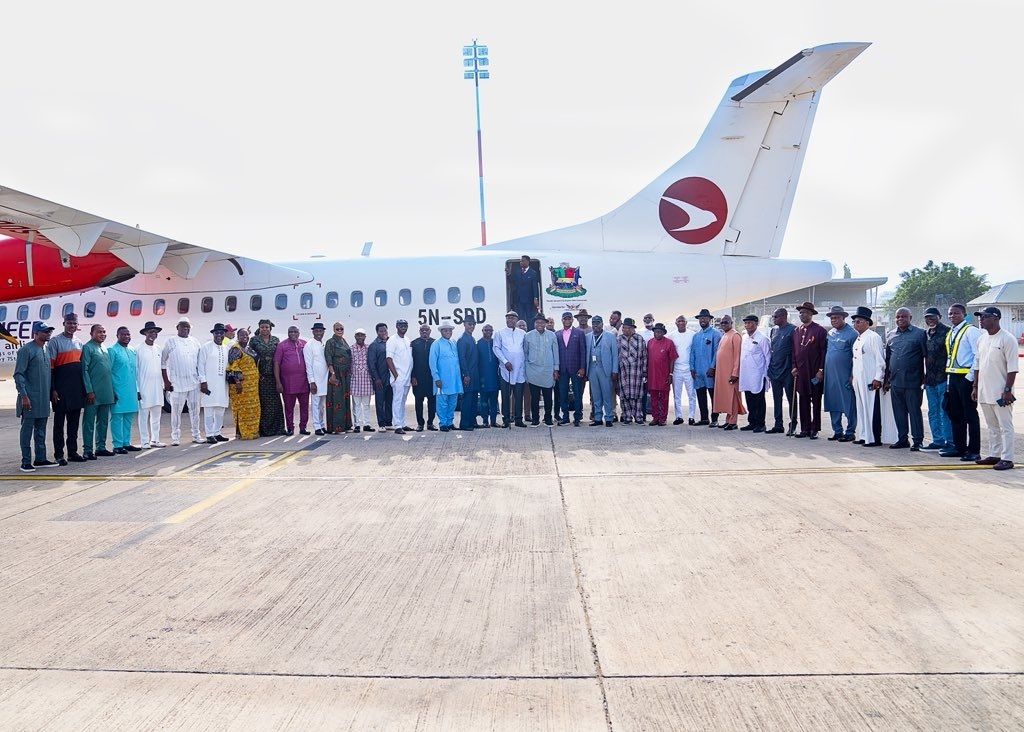
Seek incorporation of traditional rulers into state security councils
To recalibrate communication devices for inter-state cooperation
Insist on establishment of state police
Restate support for Tinubu’s re-emergence in 2027
Emmanuel Addeh in Abuja
The Southern Governors’ Forum (SGF) and the Southern Nigeria Traditional Rulers Council (SNTRC) yesterday met to fashion out implementable plans to push back terrorists from having a foothold in the region.
At the meeting which was held at the Governor’s Residence, Iperu-Remo, Ogun State, the sub-national leaders resolved to set up a zonal security fund to support security operations and capacity building.
In a communiqué issued at the end of the joint meeting, the 17 governors from the South-west, South-east and South-south, also agreed to institutionalise a monthly zonal security coordination meeting of security advisers.
Alongside the Southern Nigeria traditional rulers, the communiqué added that aside from ramping up security, other matters of urgent regional and national importance, including governance, development cooperation, and institutional partnerships were deliberated on.
While reaffirming its commitment to the unity of Nigeria, the deepening of regional collaboration, and the strengthening of a more inclusive, secure, and equitable federation, the joint meeting encouraged all member states to formally incorporate traditional rulers into their state security councils, recognising that these institutions are closest to the grassroots and hold critical intelligence capacities.
“Following a thorough review of the security landscape, the Forum resolved as follows: Member states of each geopolitical zone will contribute to a dedicated fund to support zonal security operations and capacity building. A monthly zonal security coordination meeting of security advisers will be institutionalised.
“The Forum adopted an intelligence-sharing framework supported by modern communication equipment and surveillance technologies, enabling real-time monitoring and coordinated responses across states. To this end, the forum resolved that each member state in each zone (that is SW, SE & SS) shall jointly invest in equipment that will allow effective communication across state lines.
“The Forum reiterated its longstanding call for the establishment of state police as a constitutional imperative. It emphasised that the success of community-based and regional security outfits underscores the urgent need for decentralised policing,” part of the communiqué stated.
The governors and traditional rulers further encouraged member states to collaborate with the National Identity Management Commission (NIMC) to implement a unified state resident identification system.
Besides, the Forum resolved to enhance regional and local security outfits including hunter associations and community-based surveillance units through the provision of equipment, logistics, and operational support.
In the same vein, the participants were urged to partner with traditional rulers to regulate land allocation and prevent indiscriminate practices that could lead to security risks. The Forum also resolved to combat illegal mining activities, which have caused significant ecological damage, by working with environmental authorities and traditional councils.
In terms of institutional strengthening of traditional councils, member states were also encouraged to provide direct financial and operational support to their traditional councils, enabling them to play a more effective role in governance, security, and peacebuilding.
In what the group termed a strong demonstration of unity, it jointly passed a vote of confidence in President Bola Tinubu, ‘in recognition of his leadership and unwavering commitment’ to national stability and reform.
The Forum recalled the Asaba Accord, wherein Southern Governors, in May 2021, unanimously advocated for a president of Southern extraction, restating its support for a Southern president and in person of Tinubu in 2027.
It addressed what it said were attempts to sow discord and propagate disinformation and fear within the region, reassuring citizens that Southern Nigeria remains united, indivisible, and committed to peaceful coexistence across religious and cultural lines.
The Forum pledged to continue speaking with one voice, advancing the collective interests of the South, and working collaboratively with the federal government to promote peace, prosperity, and progress for all Nigerians.
The joint forum also extended its condolences to Tinubu on the tragic loss of military personnel in Borno State, as well as the recent mass abductions in Kebbi, Kwara, and Niger States, acknowledging the successful rescue efforts, which have reassured citizens that national security remains a top presidential priority.
“The joint meeting expressed deep appreciation to Mr. President for his bold and visionary leadership in restoring macroeconomic stability, noting especially the gains in foreign exchange stabilisation, sustained reduction in inflation for the seventh consecutive month, and the easing of food prices.
“Furthermore, the Forum praised the administration’s transformative infrastructure agenda, citing landmark projects such as the Lagos–Calabar Coastal Road and the Sokoto– Badagry Superhighway amongst others.
“The Forum also commended President Bola Ahmed Tinubu’s commitment to rebuilding the integrity and capacity of Nigeria’s security forces, notably through the rehabilitation of Police and NSCDC training colleges. The Forum welcomed the launch of the Renewed Hope Ward Initiative—a transformative grassroots programme expected to directly benefit over five million people across Southern Nigeria,” the communiqué stressed.
The joint session reinforced the strategic role of traditional institutions in governance, security, and cultural integration, with both the SGF and the SNTRC pledging their collective support for the federal government’s security architecture.
While emphasising that no effort would be spared in safeguarding lives and property, it reaffirmed its commitment to working collaboratively with traditional institutions and law enforcement agencies for intelligence gathering, early warning, enforcement, and deterrence of criminal activity.
Security chiefs from the Nigerian Army, Nigeria Police Force, Department of State Services (DSS), and the Nigeria Security and Civil Defence Corps (NSCDC) were in attendance and provided briefings on the security situation across the region, with emphasis on equipment deficits, manpower gaps, intelligence coordination, and federal-state synergies.


